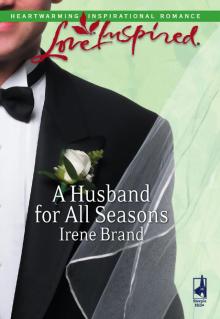- Home
- Irene Brand
Love Finds You in Valentine, Nebraska Page 3
Love Finds You in Valentine, Nebraska Read online
Page 3
“Looks like that’s a good place for me to read tonight.”
“‘Keep on loving each other as brothers,’” June read. “‘Do not forget to entertain strangers, for by so doing some people have entertained angels without knowing it.’”
knowing it.’”
Kennedy understood why June had thought the words were appropriate, but she shook her head, indicating to June that she wasn’t an angel. She peered sideways at Derek, wondering if he, too, considered her an angel. He was reading a magazine.
In her slow voice, June continued to read reverently, and the words that spoke most clearly to Kennedy’s needs were, “‘Never will I leave you; never will I forsake you,’” found in verse 5. She needed this biblical assurance that she was never really alone when the Spirit of God lived within her heart. After watching the warm comradeship between Derek and June, Kennedy had realized afresh how much she missed her parents.
When June finished the chapter, she laid the Bible aside. “Join me in prayer if you want to. I always kneel when I pray.” Without hesitation, Kennedy slid to her knees on the floor, lifted her elbows to the couch, and cradled her head in her hands, but she felt a wall between her and God. Jesus had been specific in His admonition that if people didn’t forgive those who mistreated them, God wouldn’t forgive their sins. The intense dislike she’d harbored all her life against her grandfather Morgan had surfaced today, and it stood between Kennedy and the spiritual growth she wanted. Here in the area where the Morgans lived, the loathing for her grandfather seemed to be intensified. Why couldn’t she forgive the man for the way he had treated her mother?
After June’s short but sincere prayer, which included her thanks for Kennedy’s visit, she paused, and although she wasn’t in the habit of praying aloud, Kennedy said quietly, “God, bless the Sterlings for the way they’ve welcomed me into their home and lives. This morning we were strangers, but now we’re friends. Father, I have so many decisions to make. Please give me the wisdom to make the right choices and the grace to forgive the sins of others. Amen.” Kennedy heard June standing, and she scrambled up from her knees. Wondering why Derek hadn’t taken part in the family devotions, she turned toward his chair. It was empty! She had heard Derek stirring as his mother prayed, and she thought he might be kneeling in prayer, too, but apparently he didn’t share his mother’s faith.
Temporarily bewildered by the unfamiliar surroundings, Kennedy awakened suddenly and sat up in bed. Outside her window, a rooster announced the dawning of the day.
She peered at the illuminated face of her travel alarm. Five o’clock? She yawned and looked again, but her eyes hadn’t deceived her. It was five o’clock in Nebraska but only three o’clock at home. She slipped out of bed and went to the window. Daylight was filtering through the haze that hung over the river valley, and birds sang lustily to herald the beginning of a sunny morning in early May. She must be facing east, for a narrow layer of pink indicated the rising sun.
How strange it was to wake up in Derek’s room. She got back into bed and snuggled beneath the handmade quilt, feeling lost in the king-sized bed. Considering Derek’s height and his brawny shoulders, he needed a large bed, but it was too sizable for her. The room reminded Kennedy of her father’s bedroom.
Derek was a puzzle to Kennedy. Would his room help her see beyond his attractive male physique and learn what he was like as a person? She’d been too tired last night to pay much attention to the room, but she glanced around now with interest. Knowing she wouldn’t go to sleep again, she stuffed two pillows behind her back and surveyed the large room that seemed to fit Derek’s character. As her eyes adjusted to the dim light, she saw five wide-brimmed hats hanging on the wall.
A wooden rack on the back of the door held several bolo ties and a display of ornamental belt buckles.
When Kennedy had hung up her garments the night before, she had noticed shirts, jeans, vests, coats, and several pairs of boots in the closet. One garment bag evidently held a dress suit, but every other garment was casual wear. Derek obviously didn’t go in for the elaborate outfits of some Westerners she’d noted on television. Kennedy had a feeling that she had seen Derek as he would always be. Nothing fancy about him, but she had a feeling that he would be a good man to have around when things got rough.
Kennedy stretched out in the bed with a sense of well-being as the new day broke around her. Through the open window, she heard horses stamping their feet in the corral, cattle bawling, and the clear, lilting call of a bird—an exuberant, bubbling medley of rich flutelike calls. Could it be a meadowlark? That was one of Nebraska’s birds that her mother had missed hearing in California.
Kennedy couldn’t believe that this time yesterday she had been in Los Angeles and had never heard of Derek Sterling or his mother. Their way of life differed so much from hers that it was inconceivable that she felt so comfortable, safe, with them. But she couldn’t impose on the Sterlings any longer. She had come to Nebraska without any long-range plans, so what was she going to do now?
Kennedy dozed a little until she heard water running in the bathroom beside her. June soon knocked on her door.
“You awake, Kennedy?”
“Yes.”
“Breakfast is in thirty minutes. You’ll have the bathroom to yourself until then. Derek will wash up in the bunkhouse.” Kennedy hurried out of bed and opened the suitcase she’d brought from the car last night and chose her personal items for the day. She had hung up a pair of green cotton slacks and a short-sleeved blouse before she’d gone to bed, which might not be warm enough, for she had already noticed that it was colder here than in Los Angeles. But she had a sweater in the car if she needed it. When she took her clothes from the closet, she noticed that they had picked up a musky, masculine scent, one she’d always associated with her father’s closet. Would the fragrance of her perfume and makeup be left behind for Derek? Amused, she figured a he-man like him wouldn’t appreciate having his clothes smell like women’s cosmetics.
She took a cosmetic bag from the suitcase and went to the bathroom. She showered but didn’t take time to wash her hair, for although she wasn’t hungry, she didn’t want to be late for breakfast. She’d already caused the Sterlings enough trouble.
When she entered the kitchen, the delicious aroma of ham and perking coffee tempted her taste buds. “Good morning,” Kennedy said.
June, busy at the stove, turned her head and greeted Kennedy with a smile. “Same to you. You still look sleepy—I should have let you sleep in.”
“Oh, I was already awake. The rooster took care of that.”
While June placed food on the table, Kennedy looked through the screen door that opened out onto a porch and saw Derek sauntering toward the house. She opened the door for him, and he looked surprised to see her.
“I thought our city girl would still be in bed,” he drawled.
“I didn’t want to miss one of your mother’s meals,” Kennedy answered pertly.
As they ate and chatted about life on the ranch, Kennedy compared her life to theirs. It all seemed a novelty to her now, but she was sure she could never adapt to their lifestyle on a permanent basis.
“What can I do for you today?” Derek said when he finished his breakfast.
“I want to look over Riverside. Now that I know where it’s located, I can go alone. I don’t want to take you away from your work.” He shook his head. “There’s always work to do on the ranch, but there’s nothing pressing today to keep me from showing you around. Your only interest seems to be in the house, but I’d like for you to see the ranch itself—the rangeland, the cattle, the vastness of it all—and let you experience the kind of work we do. It’s important for you to know what your birthright includes before you sell it.”
She gave him a curious gaze. “Let me ask you a question. If you owned this land, would you sell it?”
“Never in a million years.”
“Why don’t you buy it, then?” Kennedy asked.
“W
hy don’t you buy it, then?” Kennedy asked.
Derek took a quick, sharp breath and stared at her. “Do you have any idea what a spread like this would sell for?” Kennedy shook her head.
“Depending on who buys it and what they aim to do with it, it would probably sell for a million dollars or even higher. That’s more money than I could ever hope to have,” he added bitterly.
He stood and walked to the screen door. Kennedy was stunned at Derek’s quick change of temperament, and she glanced guiltily at his mother.
With his hand on the doorknob, Derek turned halfway toward her. His eyes were as sharp as summer lightning. “I know it isn’t any of my business, so I shouldn’t even say it, but I can’t imagine why anyone who had the Circle Cross given to her would ever consider selling it!” He took a hat from a nail by the door and jammed it onto his head. “I’ll be waiting to take you to the house when you’re ready,” he said over his shoulder, as he stalked out the door.
Chagrined, Kennedy stared helplessly at June. “What’s that all about?”
June reached across the table and patted her hand. “You touched a raw nerve, but his anger wasn’t aimed at you. Derek would like to have his own ranch. He knows it isn’t possible, and he’s touchy about it. We did the best we could for him, but we’ve never accumulated any money. It’s too bad he’s from a poor family with no one to back him.”
After their first stormy meeting she and Derek had been on amiable terms, and Kennedy was heartsick that she’d unintentionally wounded him. She thought of how supportive he’d been and how he had held her hand last night when coming home to Riverside was so difficult for her.
Her distress must have shown in her expression, for June said, “Derek isn’t one to hold a grudge—he knows you didn’t mean to hurt him.”
“I hope so. Will you let me help with the dishes before we leave?” Kennedy asked.
“No need of that,” June insisted. “You go on and enjoy the day.”
“I really appreciate how kind you’ve been to me,” Kennedy said.
“You’re not leaving today, are you?” June asked.
“I don’t know how long I’ll stay in the area, but I won’t impose on you any longer. I’ll get a motel in Valentine. Frankly, June, I don’t know what I expected to achieve by coming here. Dad let his cousin handle the ranch affairs, and maybe I should have left it that way. Smith thinks I should sell. Derek thinks I shouldn’t.
What’s your opinion?”
As she started clearing dishes from the table, June said, “I don’t mean to pry into your affairs, but from what I’ve gathered through the years, you don’t need the money from the ranch to live on, do you?”
Kennedy shook her head slowly. “No. Dad used to say that the Circle Cross income was peanuts compared to his other investments. I often wondered why he kept the ranch, unless it was to annoy Grandfather Morgan.” A thought popped into Kennedy’s head. “Do you think he’s the one who wants to buy the ranch?”
“I wouldn’t be surprised. And since you asked for my opinion, here it is. If you don’t need the money, I can’t see any hurry to get rid of this property, and I’d find out who wants to buy it and not sell to the first person who comes along. I’d also want to know what the purchaser intends to do with the ranch.” Kennedy drew the older woman into a close embrace. “Thank you. I needed some motherly advice, and I’ll do what you say. Dad wouldn’t want the Morgans to get ahold of his home place. I figure you’re going to see a lot of me while I check out what’s going on.”
“God bless you, Kennedy. I pray that He’ll give you the wisdom to make the right decision.”
“I’ll be praying, too,” Kennedy said, “as well as reading the Bible for guidance.” Derek sat on the corral gate watching for Kennedy. Why had he taken his frustrations out on her? There was no excuse for his outburst. But rich people had no idea how it felt to be poor. If they wanted something, they bought it. It was as simple as that! If he could only admit that he would never make enough money to buy property and be content to work for someone else all of his life, as his father had done, he would save himself a lot of grief.
When Kennedy stepped out on the porch, he slid off the fence, noting as she approached how her beauty enhanced an otherwise ordinary house. He took the bag she carried. “Leaving us?”
Smiling, she said, “Not right away, but I’m going to check into a motel today. I’ll admit that it was comforting to spend the night in your home, but I won’t stay here any longer and make extra work for your mother. And I know you can’t be comfortable sleeping on a bunk when you’re used to a king-size bed. But I won’t go back to California yet, at least not until Cousin Smith comes home. When you have free time, I’d appreciate having you show me around the ranch.”
“I’ll make the time.”
Derek wondered if he should apologize for his eruption at the breakfast table, but she didn’t seem offended, so he said nothing. “Let’s go.” As they headed toward the blue pickup, Wilson came running and looked up at Derek. “Yes, you can go,” Derek said. Wilson jumped into the truck.
Kennedy’s mouth quirked with suppressed laughter. “Can that dog understand English?”
“Better’n some people.”
A smile hovered on Kennedy’s lips as she eagerly looked at the landscape where cattle grazed in the pastures and cottonwood trees formed an arch over the road.
Derek hadn’t had much interest in women and seldom sought their company. It was a novelty to be entertaining the lady owner of the ranch.
Derek carried her suitcase to the car before he opened the truck door and gave Kennedy a boost into the seat. “We’ll look over the house at Riverside first, and then if there’s time we can see some of the ranchland. It’s a wonderful ranch, Kennedy. My dad was a good caretaker, and I’ve tried to be.” Derek loved the ranch and hoped that Kennedy would see why.
“Does Cousin Smith take much of an interest?”
Derek shrugged his muscular shoulders. “Not much. I report to him if there’s a problem, and he receives the quarterly reports. I pretty much operate the ranch as I want to.”
As he stopped the truck and unlocked the gate, he marveled at how comfortable he felt with Kennedy. She was rich and he was poor, but it didn’t seem to matter.
And the fact that she was his boss didn’t bother him at all—but he figured he was still in shock from her sudden appearance into his life. After a few days, he would come down to earth and realize that Kennedy Blaine was as far out of his reach as the moon and stars. But for a woman who’d been born with the proverbial silver spoon in her mouth, he had to admit that she wasn’t a bit stuck-up, except for yesterday when she’d called him a cowhand and labeled Wilson a mongrel. Of course, he’d provoked her to anger, so he didn’t hold it against her. And if he came right down to it, he was a cowhand.
Chapter Three
When they came in sight of the house, Derek stopped the truck and Kennedy studied the scene before her. Sunlight filtered through the leaves of the cottonwood trees behind the house, and it looked like a different building from the one Kennedy had seen the night before. The evening shadows had caused it to look like a fairyland, but in the morning sun, the house looked old and neglected. The white paint was peeling. A few of the shutters were askew, some palings on the porch rail were missing, and the shrubbery around the foundation needed to be trimmed.
Derek must have noticed her disappointment in the appearance of the place, for he put the truck in gear and moved forward. “The upkeep of this house isn’t my responsibility. As I told you, Mr. Blaine asks Mom to clean once in a while, and we mow the grass a few times every year.” When Derek stopped the truck again, Kennedy said, “I suppose I expected it to look like the picture I’ve known since I was a child. It hangs on the wall of Dad’s office, and I often wondered why he kept it when he didn’t want to come back here. Although I suppose it was Mother who couldn’t return, and he wouldn’t come without her.”
“But you k
ept in touch with some of your family,” Derek said.
“None of the Morgans. Cousin Smith and his wife came to see us a few times. And Dad’s parents visited us every year until Grandmother died. You probably know that after her death, Grandpa spent winters with us in California.”
Derek nodded. “There hasn’t been a caretaker on the place since he died—so it would naturally be run-down,” he said, as if he was sorry she had to see the house in this condition.
As they got out of the truck and walked toward the house, Derek asked, “What caused the ruckus between the Blaines and the Morgans? I’ve often wondered.”
“Oh, it was one of those crazy feuds that started years ago, and the next generations wouldn’t let go of it. Jonathan Morgan and Alexander Blaine were best friends. They came west in the 1870s and made their fortunes in the Black Hills Gold Rush. They started back East with their gold, saw the lush grasslands of this area, and decided to settle here. Then they both fell in love with the same woman, and when she chose Alexander Blaine, my Morgan ancestor declared war on all Blaines. His hatred affected succeeding generations, but according to Dad, the animosity has about died out.”
“Except for Gabriel Morgan.”
“Yes. Dad said the bickering will never die as long as he lives.” Grimacing, Kennedy added, “I don’t have a very good legacy, Derek.”
“That’s true about a lot of us,” he said quietly.
He inserted the large metal key into the lock of the front door, and the lock snapped back with a squeak. He held the door open for her, and she walked into semidarkness.
“It’s dark in here because we keep the shutters closed. Stay put until I open the ones in the living room, and then I’ll go to the back porch and turn on the power.
We keep the electricity on all the time to have some heat during the winter.”

 Love Finds You in Valentine, Nebraska
Love Finds You in Valentine, Nebraska To Love and Honor
To Love and Honor A Family for Christmas
A Family for Christmas Christmas in the Air
Christmas in the Air Summer's Promise
Summer's Promise A Life Worth Living
A Life Worth Living Made for Each Other
Made for Each Other A Husband for All Seasons
A Husband for All Seasons A Love to Treasure
A Love to Treasure The Sound of Secrets
The Sound of Secrets Love Finds You Under the Mistletoe
Love Finds You Under the Mistletoe Autumn's Awakening
Autumn's Awakening Song of Her Heart
Song of Her Heart The Test of Love
The Test of Love Yuletide Stalker
Yuletide Stalker Tender Love
Tender Love Listen to Your Heart
Listen to Your Heart Yuletide Peril
Yuletide Peril